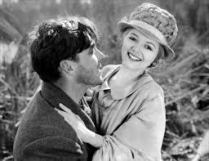



20 October
 Shoes (Dir. Lois Weber, US, 1916) (Screening format – not known, 60mins) Having directed several films in tandem with her husband Phillips Smalley, Lois Weber went solo with the 1916 production Shoes. The film was based on a Collier’s Magazine story by Stella Wynne Herron, which in turn was inspired by a quote from a book by 19th-century humanitarian Jane Addams. The heroine, working-girl Eve Meyer (Mary McLaren), is unable to afford a new pair of shoes on her meager wages. After several frustrating weeks of trying to scrimp and
Shoes (Dir. Lois Weber, US, 1916) (Screening format – not known, 60mins) Having directed several films in tandem with her husband Phillips Smalley, Lois Weber went solo with the 1916 production Shoes. The film was based on a Collier’s Magazine story by Stella Wynne Herron, which in turn was inspired by a quote from a book by 19th-century humanitarian Jane Addams. The heroine, working-girl Eve Meyer (Mary McLaren), is unable to afford a new pair of shoes on her meager wages. After several frustrating weeks of trying to scrimp and  save, Eve is reduced to selling herself sexually for the sake of the shoes. She comes to regret this decision, bitterly ruminating over “what might have been” during the film’s somber closing scenes. Rarely seen, this forgotten classic has recently been beautifully restored by Eye Film Institute Netherlands and gives a sense of Weber’s talent behind the camera. Find out more at wikipedia.org . Presented as part of the Dublin Workers Film Festival. With introduction by Silent London’s Pamela Hutchinson. With recorded soundtrack. New Theatre, Dublin Link
save, Eve is reduced to selling herself sexually for the sake of the shoes. She comes to regret this decision, bitterly ruminating over “what might have been” during the film’s somber closing scenes. Rarely seen, this forgotten classic has recently been beautifully restored by Eye Film Institute Netherlands and gives a sense of Weber’s talent behind the camera. Find out more at wikipedia.org . Presented as part of the Dublin Workers Film Festival. With introduction by Silent London’s Pamela Hutchinson. With recorded soundtrack. New Theatre, Dublin Link
 October: Ten Days That Shook The World (Dir. Sergei Eisenstein, 1927) (Screening format – not known, 104mins) Borrowing its title from a book by American journalist John Reed, Sergei Eisenstein’s Ten Days That Shook the World reenacts the crucial week-and-a-half in October, 1918, when the Russian Kerensky regime was toppled by the Bolsheviks. Eisenstein used the film to further develop his theories of film structure, using a concept he described as “intellectual montage”, the editing together of shots of apparently unconnected objects in order to create and encourage intellectual comparisons between them. A largely non-professional cast was employed, the “actor” playing Lenin, a nonprofessional cement factory worker named Nikandrov, so closely resembles the genuine article that the effect is striking while a University student took on the role of Kerensky and Zinoviev was played by his real brother. The film was not as successful or influential in the Soviet Union as Battleship Potemkin with audiences finding the film stilted and artificial. Eisenstein’s montage experiments met with official disapproval; the authorities complained that October was unintelligible to the masses and he was also required to re-edit the work to expurgate references to Trotsky, who had recently been purged by Stalin. Nevertheless, film historians now consider it to be an important film, a sweeping historical epic of vast scale, and a powerful testament to Eisenstein’s creativity and artistry. Find out more at imdb.com. Presented as part of the Dublin Workers Film Festival. With introduction by Silent London’s Pamela Hutchinson. With recorded soundtrack. New Theatre, Dublin Link
October: Ten Days That Shook The World (Dir. Sergei Eisenstein, 1927) (Screening format – not known, 104mins) Borrowing its title from a book by American journalist John Reed, Sergei Eisenstein’s Ten Days That Shook the World reenacts the crucial week-and-a-half in October, 1918, when the Russian Kerensky regime was toppled by the Bolsheviks. Eisenstein used the film to further develop his theories of film structure, using a concept he described as “intellectual montage”, the editing together of shots of apparently unconnected objects in order to create and encourage intellectual comparisons between them. A largely non-professional cast was employed, the “actor” playing Lenin, a nonprofessional cement factory worker named Nikandrov, so closely resembles the genuine article that the effect is striking while a University student took on the role of Kerensky and Zinoviev was played by his real brother. The film was not as successful or influential in the Soviet Union as Battleship Potemkin with audiences finding the film stilted and artificial. Eisenstein’s montage experiments met with official disapproval; the authorities complained that October was unintelligible to the masses and he was also required to re-edit the work to expurgate references to Trotsky, who had recently been purged by Stalin. Nevertheless, film historians now consider it to be an important film, a sweeping historical epic of vast scale, and a powerful testament to Eisenstein’s creativity and artistry. Find out more at imdb.com. Presented as part of the Dublin Workers Film Festival. With introduction by Silent London’s Pamela Hutchinson. With recorded soundtrack. New Theatre, Dublin Link
NB. Whilst every effort has been taken to ensure that the information contained in these listings is accurate, silentfilmcalendar.org can take no responsibility for any errors or inaccuracies. You are strongly advised to confirm with the venue that the event remains as detailed, particularly if traveling any distance to attend.
